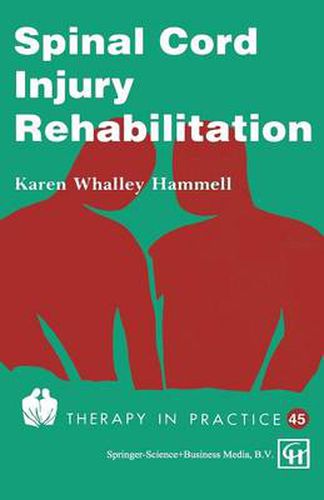Readings Newsletter
Become a Readings Member to make your shopping experience even easier.
Sign in or sign up for free!
You’re not far away from qualifying for FREE standard shipping within Australia
You’ve qualified for FREE standard shipping within Australia
The cart is loading…






This title is printed to order. This book may have been self-published. If so, we cannot guarantee the quality of the content. In the main most books will have gone through the editing process however some may not. We therefore suggest that you be aware of this before ordering this book. If in doubt check either the author or publisher’s details as we are unable to accept any returns unless they are faulty. Please contact us if you have any questions.
Spinal cord injury produces a unique multiplicity of problems which must be clearly understood by the considerable numbers of health care and rehabilitation professionals involved in their lifetime management. This book assumes an educational approach to spinal cord injury management, in which the individual becomes an active participant in goal setting, problem solving, and in assuming self responsibility. Rehabilitation is discussed in terms of client empowerment, client-professional partnerships and examines the client in the context of his unique socio-cultural environment. This book attempts to present an educational and psychosocial model for the rehabilitation of people with spinal cord injuries. In line with this approach, the first chapters present a concept of empowerment in rehabilitation and of an educational view of the process of learning to live with a suddenly acquired disability. The medical aspects of spinal cord injury follow, with a study of aetiology, impairments, acute care, disability reduction and engagement in self care activities. The management of high lesions in a rehabilitation context is examined separately, since this is a highly specialised area and one which is largely ignored both in therapy literature and in professional practice. The final chapters focus upon psychological issues, and upon such issues as productivity, leisure, socialization which are important both in early phases of management and in the long term.
$9.00 standard shipping within Australia
FREE standard shipping within Australia for orders over $100.00
Express & International shipping calculated at checkout
This title is printed to order. This book may have been self-published. If so, we cannot guarantee the quality of the content. In the main most books will have gone through the editing process however some may not. We therefore suggest that you be aware of this before ordering this book. If in doubt check either the author or publisher’s details as we are unable to accept any returns unless they are faulty. Please contact us if you have any questions.
Spinal cord injury produces a unique multiplicity of problems which must be clearly understood by the considerable numbers of health care and rehabilitation professionals involved in their lifetime management. This book assumes an educational approach to spinal cord injury management, in which the individual becomes an active participant in goal setting, problem solving, and in assuming self responsibility. Rehabilitation is discussed in terms of client empowerment, client-professional partnerships and examines the client in the context of his unique socio-cultural environment. This book attempts to present an educational and psychosocial model for the rehabilitation of people with spinal cord injuries. In line with this approach, the first chapters present a concept of empowerment in rehabilitation and of an educational view of the process of learning to live with a suddenly acquired disability. The medical aspects of spinal cord injury follow, with a study of aetiology, impairments, acute care, disability reduction and engagement in self care activities. The management of high lesions in a rehabilitation context is examined separately, since this is a highly specialised area and one which is largely ignored both in therapy literature and in professional practice. The final chapters focus upon psychological issues, and upon such issues as productivity, leisure, socialization which are important both in early phases of management and in the long term.